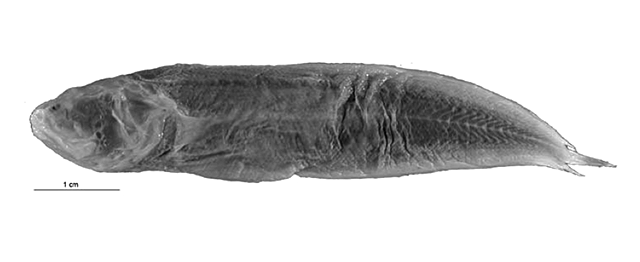| Dinematichthyidae (Viviparous brotula) |
| 7 cm SL (male/unsexed) |
|
reef-associated; marine; depth range 0 - 15 m |
| Western Pacific: Ryukyu Islands, Japan and the northern Philippines, but not in Taiwan; to the south and east, it is replaced by Diancistrus atollorum. |
|
Dorsal spines (total): 0-0; Dorsal soft rays (total): 70-76; Anal spines: 0-0; Anal soft rays: 55-61; Vertebrae: 39-41. Diagnosis: This species is characterized by the following: vertebrae 11+28-30=39-41, dorsal fin rays 70-76, anal fin rays 55-61; eyes very small (<2.0% SL); outer pseudoclasper ear-lobe shaped, the half-moon shaped ear-lobe extension inwardly directed; inner pseudoclasper firmly joined to outer pseudoclasper anteriorly, with supporter, reduced small hook-like, often with a fleshy flap at its base; 5-7 rows of small scales on the upper cheek, no scales on operculum; head profile is slender; otolith length to height ratio <2.0 (Ref. 57884).
Description: Head scales present on cheeks, absent from operculum. Caudal fin well developed, free from dorsal and anal fin (Ref. 559).
Description: Characterized by depth of body at origin of anal fin 15.9-19.8 (mean= 18.0) % SL; short and curved penis (Ref. 90102). |
| Rare species (Ref. 34024). Solitary inhabitant of coral reef crevices to at least 15m depth, cryptic (Ref 90102). |
|
Least Concern (LC); Date assessed: 15 August 2019 Ref. (130435)
|
| harmless |
Source and more info: www.fishbase.org. For personal, classroom, and other internal use only. Not for publication.
